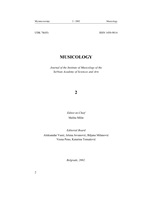Roland Barthes' »Text« and Aleatoric Music: Is »the Birth of the Reader« the Birth of the Listener?
Roland Barthes' »Text« and Aleatoric Music: Is »the Birth of the Reader« the Birth of the Listener?
Author(s): Joe Jeongwon, Song HoonSubject(s): Music, Cultural Anthropology / Ethnology, Sociology of Art, Sociology of Literature
Published by: Muzikološki institut SANU
Keywords: Roland Barthes; Post-structuralism; Aleatoric music;
Summary/Abstract: The history of Western classical music and the development of its notational system show that composers have tried to control more and more aspects of their compositions as precisely as possible. Total serialism represents the culmination of compositional control. Given this progressively increasing compositional control, the emergence of chance music, or aleatoric music, in the mid-twentieth century is a significantly interesting phenomenon. In aleatoric music, the composer deliberately incorporates elements of chance in the process of composition and/or in performance. Consequently, aleatoric works challenge the traditional notion of an art work as a closed entity fixed by its author. The philosophical root of aleatoric music can be traced to poststructuralism, specifically its critique of the Enlightenment notion of the author as the creator of the meaning of his or her work. Roland Barthes' declaration of "the death of the author" epitomizes the poststructuralists' position. Distinguishing "Text" from "Work," Barthes maintains that in a "Text," meanings are to be engendered not by the author but by the reader. Barthes conceives aleatoric music as an example of the "Text," which demands "the birth of the reader." This essay critically re-examines Barthes' notion of aleatoric music, focusing on the complicated status of the reader in music. The readers of a musical Text can be both performers and listeners. When Barthes' declaration of the birth of the reader is applied to the listener, it becomes problematic, since the listener, unlike the literary reader, does not have direct access to the "Text" but needs to be mediated by the performer. As Carl Dahlhaus has remarked, listeners cannot be exposed to other possible renditions that the performer could have chosen but did not choose, and in this respect, the supposed openness of an aleatoric piece is closed and fixed at the time of performance. In aleatoric music, it is not listeners but only performers who are promoted to the rank of co-author of the works. Finally, this essay explores the reason why Barthes turned to music for the purpose of illustrating his theory of text. What rhetorical role does music play in his articulation of "Work" and "Text"? Precisely because of music's "difference" as a performance art, music history provides the examples of the lowest and the highest moments in Barthes' theory of text, that is, those of Work and Text. If, for Barthes, the institutionalization of the professional performer in music history demonstrates the advent of Work better than literary examples, the performer's supposed dissolution in aleatoric music is more liberating than any literary moments of Text. This is because the figure of music--as performance art-- provides Barthes with a reified and bodily "situated" model of the Subject.
Journal: Muzikologija
- Issue Year: 1/2002
- Issue No: 2
- Page Range: 263-281
- Page Count: 19
- Language: English

